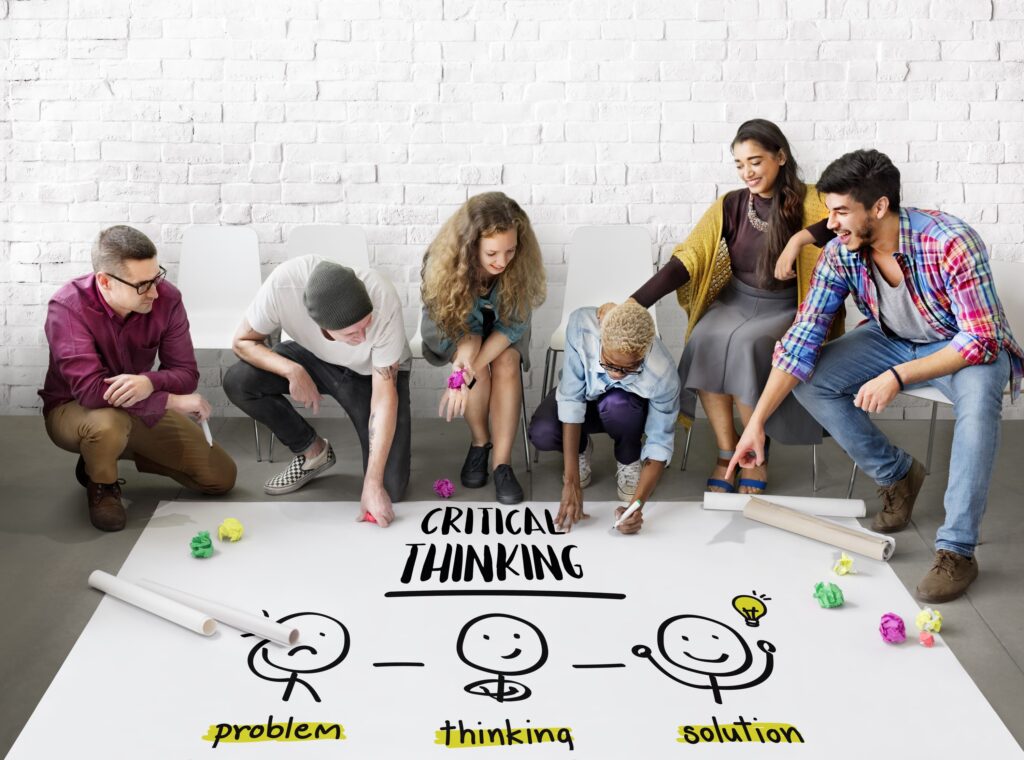Graduate school is difficult and speaking from firsthand experience, having three (and soon to be four) advanced degrees, all of my graduate school experiences have been vastly different. In each setting, I successfully navigated these programs with a variety of skills that were in some instances learned the hard way but allowed me to learn and grow for my programs later on. I count myself incredibly lucky for having great experiences and great people who helped me along the way.
One thing is for certain — for those that wish to take on the advanced challenge of receiving a higher-level degree than that of an undergraduate, several skills are necessary, including the ability to critically think. Critical thinking is one of these skills that will help you dive further into your academic studies. The ability to think critically is a powerful tool that can help you make sense of the information that is presented, making you more confident in your decision-making.
Before we examine why critical thinking plays such an important role in grad school, we must first understand what critical thinking really is. Critical thinking is a process that involves analyzing, questioning, and exploring information to reach a deeper understanding that will help you make an informed decision. It requires curiosity, logic, and observation. Critical thinkers make conscious decisions based on information, reflection, and evidence.
The Role Critical Thinking Plays in Graduate School
Critical thinking skills, in general, can encompass several smaller level abilities and traits that will behoove you as you embark on a graduate level program.
Self-Direction
First, one skill needed is self-direction. Don’t rush into a program without spending time thinking critically about the type of program that will benefit your current employment status, what will be studied or specialized in, and what type of plan will be followed.
For many, graduate school takes place in a time where other commitments are real and important, such as work, family, and other engagements that may differ from the typical college life schedule. Great critical thinking skills can also help with prioritizing what is important, allowing for excellent time management skills. This can help with balancing stress management, which is sure to come during a graduate program. Critically thinking about all the options surrounding a program and thinking through the course of action will set you up for success in the end.
Once enrolled in a graduate program, there will be numerous opportunities to utilize critical thinking skills, which will help in future employment down the road, as more and more employers are seeking applicants who can critically think “on their feet.” One of the first aspects of critical thinking in graduate school is the connection between critical thinking and great analytical skills.
As you begin your graduate studies you may notice that graduate school demands much more than just memorizing facts or information. It requires higher-level thinking to understand complex theories and multifaceted problems. Being a critical thinker enables you to dissect new concepts and devise solutions. It helps to foster a deeper understanding of what you are learning.
Academic Research
Part of your graduate studies will be to conduct academic research. This is to help increase your knowledge of a specific subject matter or concept. Having the ability to think critically is crucial for this research because you will need to research, experiment, analyze, and draw conclusions to solve complex problems. Critical thinking will help you formulate questions, interpret results, and propose solutions.
Graduate courses often involve in-depth discussions or debates about a specific subject matter or theory. Critical thinking will help you analyze or even challenge these classroom discussions enabling you to meaningfully contribute your ideas and opinions. Because critical thinking helps you understand information better by evaluating and critiquing arguments, you will be better able to express your ideas clearly, therefore enhancing your learning experience.
Further Career Prep
Lastly, graduate school prepares you for your career. Using well thought out thinking, equips you with the skills you need to make informed decisions about your future. It enables you to look at things from all angles, objectively assess them, and make a well-informed decision. It will also help you adapt to any circumstance and meet any challenge with confidence and a logical mindset.
Analytical Skills
Analyzing a difficult concept, finding ways to solve different problems, and evaluating and understanding theories are ways that critical thinking skills can be strengthened. Next, following along with analytical skills is the ability to use critical thinking skills and analytical skills to develop and create new and unique ways to find solutions to problems. In educational graduate programs, particularly at the doctoral level, this is the main challenge for graduate school students.
Their challenge is to often analyze a current practice or policy in education and make it better for the students, staff, teachers, or community in general. Great critical thinking skills are imperative for problem solving, as education today calls for those who can think outside the box and consider different angles and solutions to existing problems.
Evaluating Arguments
Next, critical thinking skills play a pivotal role in evaluating arguments and developing research proficiency to provide evidence to back up necessary justification for graduate school challenges. Too often today arguments exist with little to no empirical evidence to support any side, with people typically throwing away common sense and critical thinking simply because one side doesn’t agree with the other. In graduate school programs where ideas are challenged for the greater good, being able to evaluate and explain your position on a stance with research-based evidence is a great foundation.
Effective Communication
Many graduate school programs today challenge students to appropriately interpret and assess information as they come across it and not simply focus on how to gain access to information. This goes hand in hand with effective communication, which is only heightened by critical thinking skills. Having great critical thinking skills can sharpen your thought process and enhance your communication skills, leading to well thought out ideas and statements which are clear, concise, and evidence based.
Why Critical Thinking Skills Are Essential for Educators
Developing the ability to think critically can be a superpower for educators. It can not only help you teach better, but it can also help students learn better. Here are a few ways critical thinking skills have emerged as an important tool for educators.
It Helps You Make Decisions
Critical thinking helps you deal with any problems that may come your way. As an educator, you will encounter a plethora of dilemmas as well as have to handle sensitive issues or make decisions that may impact your students. Critical thinking skills will help you navigate these challenges as well as help you weigh your options to make the best-informed choice for your students.
It Makes You an Effective Educator
Teachers with strong critical thinking skills are better equipped to make effective decisions that will enhance student learning. When you have a strong skillset in critical thinking, you will approach your teaching with a deeper understanding. This will help you identify effective strategies to use, make data-driven decisions, adapt methods to different learning styles, and create engaging learning experiences for your students.
Facilitates Your Ability to Adapt to Change
Education is constantly evolving from new technologies to new teaching strategies, as an educator you will need to stay up to date with any new emerging education regularly. With these frequent changes, having critical thinking skills will help you determine which technologies and teaching methods are best suited for your students and your classroom.
Enhances Your Problem-Solving Skills
Educators encounter many challenges in the classroom, such as managing student behavior, adapting curriculum to suit the needs of individual students, and learning new technology. Nevertheless, possessing the toolkit of critical thinking skills empowers you to assess these challenges objectively and develop solutions that will change these problems.
Stimulates Your Curiosity
Critical thinking can stimulate your curiosity igniting your desire to dig deeper into concepts, theories, teaching methods, or other subject matter. It can inspire you to expand your knowledge and craft as an educator. By asking questions of yourself or your students you are fostering an environment of curiosity and lifelong learning.
Fosters Student Engagement
Critical thinking skills play an important role in cultivating student engagement by encouraging students to actively participate in classroom discussions and activities. By implementing critical thinking into your lessons, you will prompt students to think critically, therefore interacting in a more meaningful way with the concepts that are being taught to them. By emphasizing critical thinking, you are encouraging students to connect to what they are learning, making the material more engaging.
We All Use Critical Thinking
Critical thinking is vital, not only for you as a graduate student but also as an educator. Not only does your education and career require it, but you will also use it in your life. It will help you understand and analyze information in the news, help you make informed decisions in your day-to-day life, and maybe even help you understand yourself better so you can reach your goals. By applying thoughtful thinking to your education, career, and life, you may feel more confident in the decisions you make.
Open-Mindedness
Typically, graduate school leads students to times where their opinions may be challenged, and having effective communication can help students articulate their thoughts and ultimately persuade others in arguments or defense of their ideas. Finally, critical thinking skills in graduate school help foster a sense of open-mindedness, which leads to a greater impact on learning, and allows for more productive and organic conversations to take place that can eventually lead to a better sense of understanding.
Ultimately, critical thinking is an important trait to possess, regardless of your position. As you consider entering graduate school, take stock of your current skills and identify if critical thinking is a part of your repertoire. If not, graduate school programs can enhance that deficiency, but it will come with time and effort. As educators, whether a teacher or administrator, it is incredibly important to have critical thinking skills because we are a great influence on a child’s future.
School leaders must have a deeper understanding and practical knowledge of learning science, their area of expertise of topic, and ethical critical thinking skills. Learning new skills and pedagogy in graduate school can help when working with young people as we help them navigate their personal lives and learning journeys. Educational leaders face a myriad of differences in students, and having critical thinking skills only helps to profoundly impact our future society.
Educators never stop learning; check out our available graduate degree programs to hone your skills and promote lifelong learning and academic excellence.




